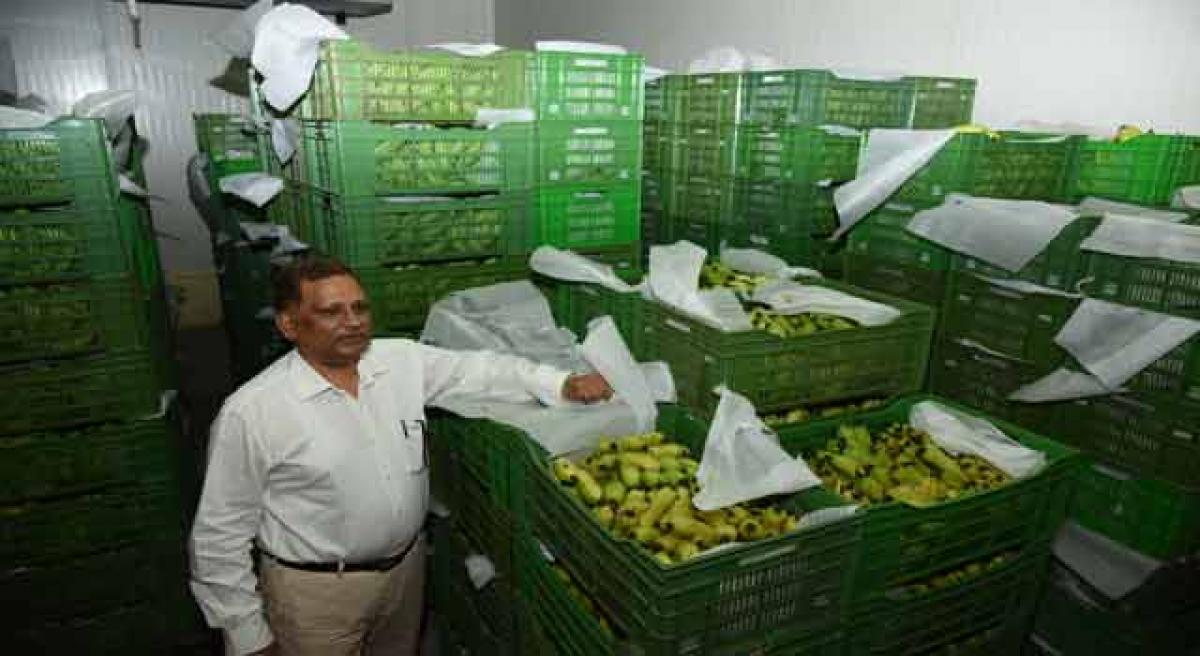Live
- Dhobi Ghat assessed for potential to host sports complex
- SCR bets on LHB train coaches for safety
- SVU felicitates best teachers
- Tata Group to market Araku coffee
- Union Min assures development of infra in tribal mandals
- KTR, Harish will turn political rivals soon: TPCC Chief
- Annabhishekam held at Sri Kapileswaa Swamy temple
- Festive glow of Karthika Pournami: Women celebrate Karthika Pournami with grandeur
- Japanese Princess Yuriko dies at 101
- Israeli strikes kill 12 rescuers
Just In

ake a stroll through the city and you can find many fruit carts sporting a placard stating ‘Carbide free mangoes’. The phenomenon has emerged this summer; explaining about it Anil Srivastava, COO, Agribusiness, Heritage Foods Ltd says, “More and more people are getting aware about the ill effects of carbide hence, fruit vendors are also taking precautions.”
Take a stroll through the city and you can find many fruit carts sporting a placard stating ‘Carbide free mangoes’. The phenomenon has emerged this summer; explaining about it Anil Srivastava, COO, Agribusiness, Heritage Foods Ltd says, “More and more people are getting aware about the ill effects of carbide hence, fruit vendors are also taking precautions.”
“The Telangana High Court has called fruit traders who use the carcinogen calcium carbide to ripen fruits as ‘worse than terrorists’.
Consumption of such artificially ripened fruits can cause mouth ulcers, gastric problems, diarrhoea and skin rashes. Free radicals from carbide play a major role in the ageing process as well as in the onset of cancer, heart disease, etc and if a pregnant woman consumes carbide laced fruits then it causes miscarriages and developmental abnormalities,” informs Anil.
There is an alternate artificial and safe way to ripen fruits, which is done by using Ethylene. Tucked in the outskirts of the city ‘Heritage Integrated Pack House’ at Mulugu, Medak district uses the process in which the natural hormone is used for ripening fruits under controlled temperatures and relatively humid conditions.
“We have our own farms and we also help the local farmers to ripen their fruits. We charge them Rs 2.50 per kg to ripen the fruits of our plant. We ripen 75 metric tonnes per day and in that, 25 metric tonnes is of local farmers. This way we also help them in not using carbide to ripen their fruits,” says Anil.
Speaking about the Ethylene ripening process Anil says, “Ethylene is a natural hormone and it does not pose any health hazard. The fruits are placed in an airtight ripening room maintained at a constant temperature (18-21 degree Celsius for most fruits and 29-31 degrees Celsius for mangoes). The process takes two-three days to ripen the fruits.”
Giving insight about how to find the difference between carbide ripened and naturally ripened fruits, Anil says, “Carbide ripened fruit will not have the natural fresh aroma of a ripe fruit.
It has a smooth, wrinkle free and shining skin. The fruit has yellow skin but the insides will be green. They have patches of green on the yellow skin and they will be very dry and not juicy as ripe fruits.”
On a signing note, Anil extols on consuming carbide free fruits and one has to check for these signs thoroughly before consuming fruits.
By:Navin Pivhal

© 2024 Hyderabad Media House Limited/The Hans India. All rights reserved. Powered by hocalwire.com







